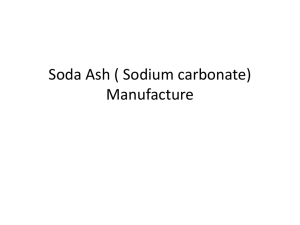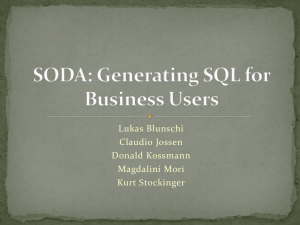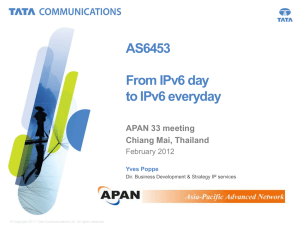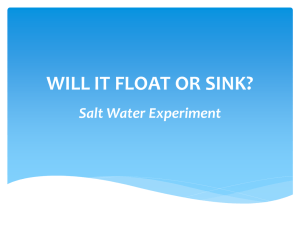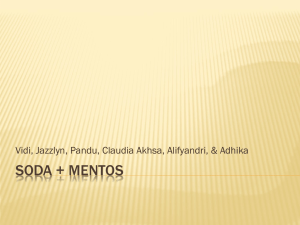Supply Chain Management TATA CHEMICALS LTD
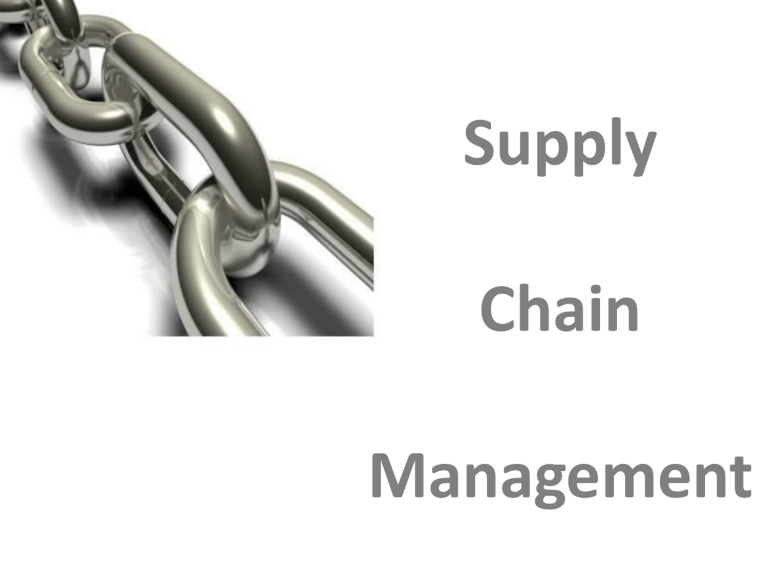
Supply
Chain
Management
TATA CHEMICALS LTD
•
•
•
•
•
•
PRESENTED BY
Janki Raval P 30
Jay Lodaya P 19
Lajja Reshamwala P 31
Pratiksha Rane C 42
Rohan Jadhav C -16
Vaibhav Tonde C -39
TATA Chemicals Ltd
• Established in 1939 at Mithapur
• Global company with interests in chemicals, crop nutrition and consumer products
• It is the world's second largest producer of soda ash
Vision
Enrich the quality of life by offering products and services that meet the essential needs of people.
Mission
We shall be the most respected company in the businesses and geographies we operate in.
Our growth and success will be achieved by:
• Enhancing the value we deliver to our customers
• Being globally competitive
• Internationalisation of our business
• Improving shareholder value
• Commitment to corporate sustainability
• Strengthening stakeholder relationships
• Providing new and innovative offerings
Chemicals
Soda ash
Sodium bicarbonate
Alkakarb
Chemicals: Caustic soda, chlorine based products, bromine based products, gypsum, phosphoric and sulphuric acids
Sodium tripolyphosphate
Products
Crop nutrition and agri-business
Fertilisers: Tata Paras urea,
DAP, NPK, SSP
Consumer products
Salt: Tata Salt, I-Shakti, Tata Salt Lite
Cooking soda : Tata Samunder
New business
Biofuels
Fresh produce
Cement: Tata Shudh
Supply Chain
• ‘Made to Order’ Supply Chain
• Orders are always more than the supply of the product
• The products which are considered for the
Supply Chain of TATA Chemicals are Soda Ash and TATA Salt
• TATA Chemicals uses SAP for the whole Supply
Chain process
Contd…
• Soda Ash: -
Prominently used in the manufacture of glass. Helps in the 'workability' or shaping of glass articles such as tableware and float glass.
Major ingredient in the making of soaps and detergents.
• Salt: -
The company makes sodium bicarbonate for pharmaceutical and industrial use, and as a food additive
Contd…
• Set Price Contract for a Set Quantity with its customers
• Price for the Product is fixed for a contracted period
• Actual price may fluctuate in the market
Procurement
• Soda Ash – Natural deposits of Soda Ash are found at Mithapur. Soda Ash from Wyoming and
Lake Magadi is bought through Sea route to
Mithapur plant. Solvay process is used to remove the impurities.
• Salt – Solar Salt is obtained from Saurashtra. The salt pans are located Okhamani in Saurashtra.
Manufacturing
• Soda Ash – Solvay process is used to remove the impurities.
The Soda Ash produced is generally of 2 varieties
– Soda Ash Light
– Soda Ash Dense
• Salt – Solar Salt is obtained from Saurashtra and Vacuum evaporation is done at Mithapur plant.
Packaging
• Soda Ash is generally packaged in 1 metric tone PP
Bags
PP Bags are used to protect Soda Ash from Caking. It protects Soda Ash from moisture and humidity..
• TATA Salt is packaged into 0.1kg, ½ kg, 1kg and 2kg convenient packages
Transportation
• The packaged goods are transported to the Mumbai
Warehouse by the means of Land as well as Rail route
• Similar model is applied all across the country except
Cochin and for Export market. For Cochin and Export market Sea route is used.
• Road Transport is the preferred means for transportation of the products to Mumbai
• It generally takes 1 – 1½ days for transportation from
Mithapur to Mumbai
Contd…
• TATA Chemicals has entered into agreement with various Transport Associations, e.g. Gujarat Truck
Association, etc.
• A single 3 rd Party Logistics Service provider cannot handle the complete load of both Soda Ash and TATA
Salt.
• The loading is done generally 50 – 50 i.e. 50% Soda
Ash and 50% Salt.
• This is done to achieve proper weight balance and maximum space utilization.
Warehousing
• 2 main Warehouse’s in Mumbai namely at Taloja and at Boisar
• The Temperature of the Warehouse is maintained around 30 - 35 ˚C to avoid humidity and moisture exposure to Soda Ash and Salt
• Soda ash tends to cake when exposed to moisture or the atmosphere for a long time
• FIFO method is used inventory control
Warehousing
• Quantity Committed Customers i.e. Contract for delivery of fixed amount of products all throughout the year
• Warehouse closer to the Warehouse of the Buyer
Company.
• For e.g. TATA Chemicals has a Warehouse established near the Warehouse of Unilever and St. Gobain
• Inventory of around 15 days is maintained
• For e.g. if Unilever has Quantity Set Contract with TATA
Chemicals for the supply of 100 metric tones/day of Soda
Ash then TATA Chemical carries an inventory of 1800 –
2000 metric tones
Warehousing
• At Central Warehouse 10 – 15 day inventory in the form of onsite storage as insurance against delivery delays
• Limited access to SAP is provided at Warehouse level
• The employees at the Warehouse are provided with special
PDA’s
• PDA’s are connected to the online system of the company, the whole data automatically gets transferred for the Warehouse to the SAP at the Central office situated at Mumbai.
Warehousing
(Material Handling)
• Avoid damp or humid place or where there is excessive air circulation
• When storing soda ash for an extended time under adverse conditions, cover the bags with a tight fitting, impermeable sheet
• Double-faced hardwood pallets are used
• Warehouse floors should be dry, smooth, free of breaks
Distribution
• TATA Salt as mentioned above is further transported to various Depots, Wholesalers, and Retailers across the state from the Central Warehouse
• The Transportation for the distribution process is carried out by the concerned Transport Association
• It is normally done by the Road Transport only
• EX WORKS Contract
Deliver goods at his or her own place of business. All other transportation costs and risks are assumed by the buyer
Distribution
• OTF Customers
Checks the available quantity at the central Warehouse. If the quantity available at the Central Warehouse is enough to meet the needs of Quantity Set Customers as well as OTF
Customers then the distribution is done to the OTF Customers
Delivery can take upto 7 – 10 days
• Export customer’s
• Distribution is done through the Sea route
• It is carried out through the port of Kandla which is closer to the plant location of Mithapur
• Same is done for Cochin
Distribution
• Since for distribution various Transport Associations are involved TATA Chemicals has better control over the cost factor involved in the Distribution process
• Cost involved in the Owning and Maintaining of vehicles for distribution is also eliminated
• Change in the daily shipment of the quantity fixed, is carried out by sending a mail to the company head office at Mumbai
Problems faced
• Distribution is one of the main problem areas for the company, since it is handled by various Transport
Associations. Some of the problems faced by the company are
Paper works required for interstate transport.
Excise duty problems.
Overloading of Trucks.
